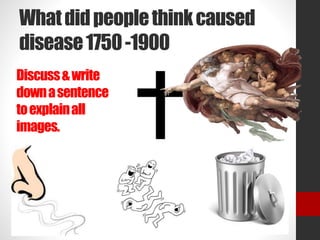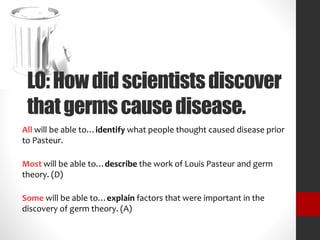1010 Pasteur
- 2. LO:Howdidscientistsdiscover thatgermscausedisease. All will be able toâĶidentify what people thought caused disease prior to Pasteur. Most will be able toâĶdescribe the work of Louis Pasteur and germ theory. (D) Some will be able toâĶexplain factors that were important in the discovery of germ theory. (A)
- 3. SpontaneousGenerationâĶ âĒ Spontaneous Generation - Disease was caused by germs that were produced by flesh and vegetables as they rotted. People believed that germs were the result of disease, not the cause of it! âĒ Miasma â Disease was caused by bad air that was filled with poisonous fumes from rotting matter.
- 4. VanLeeuwenhoek âĒ In 1677 â A clock maker from Holland, Anthony van Leeuwenhoek, made a very basic microscope. To his amazement, he found tiny creatures moving about in nearly all of the things he placed under his new intervention. Found them in water droplets, pepper, food and faeces. He called them animalcules and published his findings. Whatwerethese animalculesâĶ? Drawasmallimageofthe microscopeandexplainitâĶ
- 5. LouisPasteur WHO WAS HE? âĒ Born in France 1822. He studied chemistry and biology, taking charge of science at Lille University in 1854. It was his reputation as a top chemist that first led one of Lilleâs top wine producers to go to Pasteur for helpâĶ WHAT DID HE DO? You each have a part of the story of Louis PasteurâĶ You have 12 minutes to piece together the story of Pasteur and complete your storyboard. You must educate rather than copy âĶ
- 6. PasteurâĶ Once you have completed your storyboardâĶ - Summarise what germ theory is in your own words. - EXT: What factors were involved in Pasteur's discovery? Think! What factors have we looked at else where in the course (Jenner, how many times was the experiment repeatedâĶ) Think! What role does âindustryâ play (i.e. the silk company)?
- 8. AllWriteConsensusâĶ âĒ You now have 6 minutes to discuss an answer to the following question in your groups of four. After the 6 minutes you will write the same answer that you have discussed to the question in your own style. âĒ What factors affected Pasteurâs development of the germ theory? (12 marks). Link the factors to how they helped develop Pasteur's work. You canât write about them all, choose a couple to focus on. Group One â Lenny, Tom B, Alice, Amarilda. Group Two â Chelsea, Ellie, Liam W, Branden. Group Three â Max, Rebecca, Alice, Kira. Group Four â Connor, Joe, Shannon, Johnny. Group Five - Georgia, Asiatu, Tom H, Sophie.
- 9. PeerAssess - Answer makes general comments on the germ theory. 1-4 - Answer describes one factor such as the role of technology leading to improvements in the microscope. 5-8 - Answer includes some explanation of various factors such as scientific methods and clearly explains how these helped in the development of the germ theory. 9-12 WWW â What Went Well â Look at my comments as a guideâĶ EBI â Even Better If â Look at my comments as a guideâĶ
- 10. SummariseâĶ âĒ Summarise something that you have learnt in todayâs lesson using the Play-Doh providedâĶ âĒ You have 5 minutesâĶ it can be abstract. Prepare to Share









